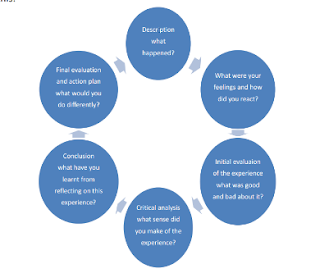What points in the
article can I relate to in my practice?
 Finlay
(2008, p 1) outlines what a general definition of reflective practice is. As a teacher I was always stopping and thinking about my practice, to enable me to
improve the way I taught. I drew on the
ideas of my colleagues, the professional readings I did and any professional
development I undertook. By analysing my
existing understandings I was able to refocus my thinking and generate new
knowledge and ideas, which changed the way I did things in my class.
Finlay
(2008, p 1) outlines what a general definition of reflective practice is. As a teacher I was always stopping and thinking about my practice, to enable me to
improve the way I taught. I drew on the
ideas of my colleagues, the professional readings I did and any professional
development I undertook. By analysing my
existing understandings I was able to refocus my thinking and generate new
knowledge and ideas, which changed the way I did things in my class.
Dewey
(1933, as cited in Ferguson 2002) believed that if teachers did not reflect,
they risked basing their practice on prejudice and uninformed or outdated
thinking. However, if they critically reflected on their practice this should
improve, provided that they used such skills as observation and reasoning, and
an open-mindedness to better ways of teaching.
 There are
other points in Finlay’s article that caught my attention, these being, ‘over
stretched professionals are likely to find reflective practice taxing and
difficult’ (p 10) and ‘when required of individuals through learning and
assessment exercises, reflections can end up being superficial, strategic and
guarded’ (p 14). I do know that as a
teacher in a busy classroom, and now that I am fully released assistant principal,
there are times when having to reflect in writing (for example as part of
teacher appraisal) is the last thing I have time for, therefore they are
written with little thought and are superficial. I am also very aware of who can see and read
my reflections, and at times rewrite my reflections so they do not reflect
badly on me, or I choose not to put my thoughts down.
There are
other points in Finlay’s article that caught my attention, these being, ‘over
stretched professionals are likely to find reflective practice taxing and
difficult’ (p 10) and ‘when required of individuals through learning and
assessment exercises, reflections can end up being superficial, strategic and
guarded’ (p 14). I do know that as a
teacher in a busy classroom, and now that I am fully released assistant principal,
there are times when having to reflect in writing (for example as part of
teacher appraisal) is the last thing I have time for, therefore they are
written with little thought and are superficial. I am also very aware of who can see and read
my reflections, and at times rewrite my reflections so they do not reflect
badly on me, or I choose not to put my thoughts down.
What model would I
like to adopt?
When I reflect on my practice I have
never used a model but on reading Finlay’s article I note the model closest to how
I reflect is the model developed by Rolfe et al. This model is very simplistic, and after
seeing the other models in the Finlay’s article I need to ensure that my reflective
practice becomes more critical, as critical reflection encourages the
combination of theory and practice while improving student learning and
self-confidence in the classroom.
The model that I would like to use is that of Gibbs (Finlay,
2002, pg8) a model developed from David Kolb’s 4 stage learning cycle. On looking further at Gibb’s model online, I
found a slightly adapted model developed by Bulman and Schultz (cited in Lia,
nd, p 2). The adapted model is below:
This model lends itself to both
reflection-in-action and reflection-on-action. It
also allows you to challenge your assumptions, explore different/new
ideas and approaches towards doing or thinking about your practice, promotes
self-improvement by giving you the opportunity to identify your strengths and
weaknesses and taking action to address, and finally, it links practice and
theory by combining doing or observing with thinking or applying knowledge.
Class Notes: Week 25 - APC - Reflective Practice. (n.d.). Retrieved
January 24, 2016, from
https://app.themindlab.com/course/release/205-week-25-apc-reflective-practice
Ferguson, P. (2012). Becoming a reflective practitioner. Teaching
Development Unit: Hamilton. Retrieved from http://www.waikato.ac.nz/tdu/pdf/booklets/18_ReflectivePractitioner.pdf
Finlay, L. (2008). Reflecting on “Reflective practice.” Retrieved
January 24, 2016, from
http://www.open.ac.uk/opencetl/files/opencetl/file/ecms/web-content/Finlay-%282008%29-Reflecting-on-reflective-practice-PBPL-paper-52.pdf
Lia, P. (nd): Using Gibbs reflective
cycle in coursework. Retrieved from https://www.kcl.ac.uk/campuslife/services/disability/service/Using-Gibbs-Reflective-Cycle-in-Coursework.pdf
Images
minlab course
notes
https://www.kcl.ac.uk/

No comments:
Post a Comment